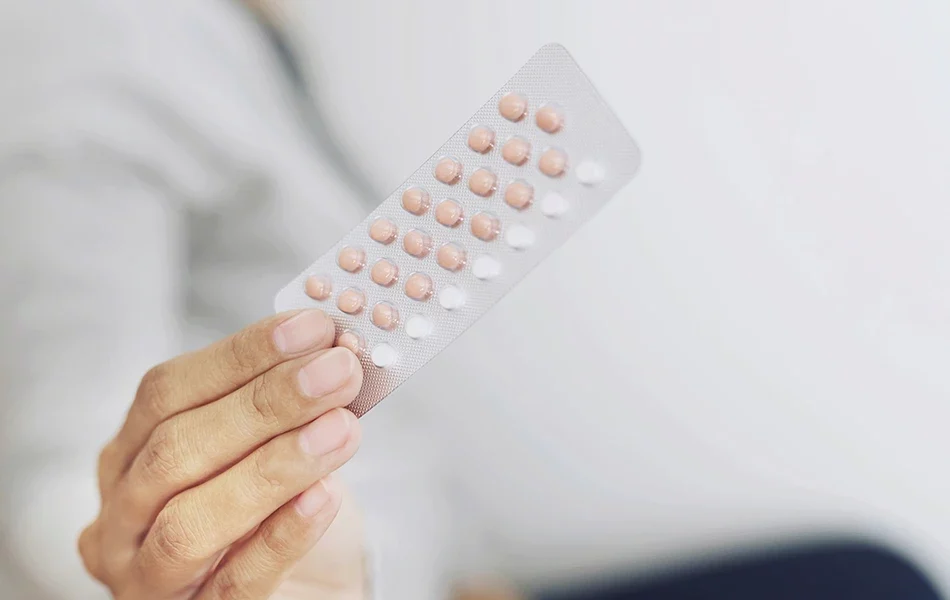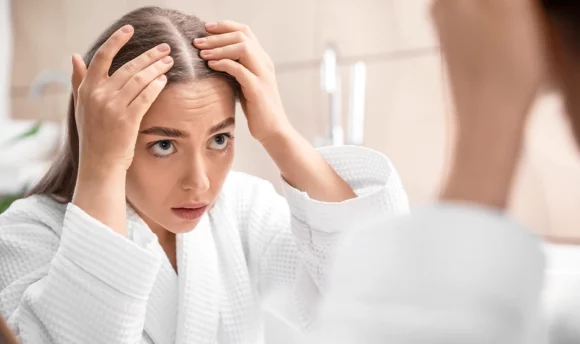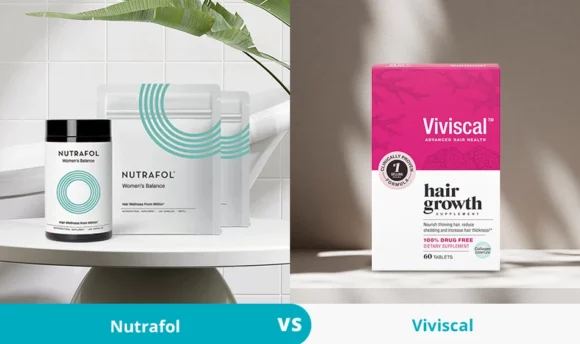Does Accutane Cause Hair Loss? Debunking the Myths
Accutane is a medication that is proven to be successful in treating severe acne. Despite its effectiveness, using the drug comes with some unwanted side effects that may be harmful to your health, including your hair.

From changing your diet to trying a variety of creams, it can be frustrating when you’re struggling to get painful acne under control. Many people eventually turn to Accutane, which is highly effective in reducing breakouts and helping to restore confidence.
Although you may have finally discovered the secret to clear skin, you’re likely to find that this medication comes with a series of unpleasant side effects, including hair loss.
Fortunately, there are ways that you can have both radiant skin and luscious locks. Read on to find out how Accutane affects hair loss and explore some options for stopping it in its tracks.
Does Accutane Cause Hair Loss?
Research has shown that hair loss is one of the negative side effects of Accutane. This is because it disrupts the normal hair growth cycle and causes follicles to multiply faster than they should. New strands cannot keep up with this process, resulting in thinning hair.
It’s likely that the longer you take Accutane and the higher your prescribed dosage, the more hair loss will occur.
However, studies show that 3–6% of people taking low doses of the treatment also experienced isotretinoin hair loss, so this is a common side effect for anyone who is prescribed the drug.
If you do begin to notice Accutane hair loss, this could be a sign that your dosage is too high, and you may need to speak to your doctor to find a good middle ground for your treatment.
Does Accutane cause permanent hair loss?
Fortunately, Accutane hair loss is only a temporary side effect, and your hair should begin growing again shortly after stopping the medication.
However, even after not taking the drug for a while, 10% of users complain of hair thinning. It can take up to a few months for your hair to return to its healthy natural state, depending on your dosage and how long you were on the medication.
If you are using Accutane and other drugs, such as Metformin or Adderall, it can even worsen the situation as some drugs are linked to extreme hair loss.
What Is Accutane?
As a type of prescription medication used for treating severe hormonal acne, Accutane was the original brand name for isotretinoin, produced by the Swiss healthcare company Roche. The drug comes in capsule form and is typically taken twice per day.
Accutane itself was banned from production in 2009 after being controversially linked to extreme side effects, including birth defects when taken by pregnant women, Crohn’s disease, and severe depression.
Although Accutane is no longer sold under the Roche name, it is still used as a generic term for other brands of isotretinoin and continues to be prescribed for severe acne.
What Causes Accutane Hair Loss?
Accutane, or isotretinoin, may cause temporary hair loss for various reasons. The medication has been linked with telogen effluvium (TE), a condition that causes hair loss all over the scalp rather than in one concentrated area.
TE occurs as a result of disruption to the hair growth cycle when hairs that are in the anagen growth phase are suddenly pushed into the telogen resting phase. Once your hair re-enters the growth stage, it will be pushed from the follicles, therefore causing shedding.
Although nutrient deficiency can cause your hair to become weak and brittle, surprisingly, having too much of one vitamin in your body can also contribute to hair loss.
As isotretinoin is a drug produced from vitamin A, taking it can elevate levels of this vitamin within your body. Research has linked excess levels of vitamin A in the body, known as toxicity, with problems such as alopecia, a form of hair loss.
This is because it increases the activity of the follicles, causing them to reach the end of the hair cycle too quickly.
Your body is unlikely to be able to keep up with the demands of the follicles and will not be able to make new hair quickly enough to replace it, resulting in hair loss.
Acne may be caused by excessive sebum production, which is an oily substance secreted by the skin to keep it moisturized. Isotretinoin reduces the amount of sebum produced to prevent it from becoming too oily.
However, having too little sebum on the scalp causes it to become dry, leaving your strands dehydrated, brittle, and weak. This puts you at a greater risk for isotretinoin-induced hair loss.
How to Prevent Accutane Hair Loss: 6 Tips to Help You Out
Although some hair loss is likely to occur when on Accutane, there are ways that you can prevent it as much as possible and limit the damage that this causes.
Here are 6 simple steps that you can take to maintain a healthy scalp, protect your hair, and increase your chances of healthy growth once you’ve completed the treatment:
#1 Take supplements
One of the best ways of preventing Accutane hair loss is by taking vitamin supplements. Specifically, you are at higher risk of folic acid deficiency while on this medication.
Vitamin B9, or folate, is essential for producing red blood cells (RBCs). Without enough RBCs, you may develop anemia, which deprives your body of the oxygen it needs to function.
This can leave you feeling extra tired and causes weakness, including to your hair.
You can increase your folate intake by eating foods that are rich in this vitamin. Consume more bananas, broccoli, and avocados. Alternatively, you could take a folic acid supplement.
Taking a biotin supplement is another great option for preventing hair shedding and promoting growth. Biotin, or vitamin B7, helps to improve the structure of keratin, a protein that builds strong and healthy skin, nails, and hair.
However, remember to avoid vitamin A supplements or multivitamins containing it, as isotretinoin is derived from this vitamin. As said before, consuming too much can cause toxicity and contribute to further hair loss.
#2 Try minoxidil spray
If you are suffering from Accutane hair loss, you could try a topical minoxidil spray. Using a spray on your hair signals blood vessels in the scalp to open, allowing more oxygen and vital nutrients to reach hair follicles.
Minoxidil is an over-the-counter medication that is often prescribed to treat androgenetic alopecia and other hair loss conditions. Currently, it is the only drug on the market that has been clinically proven to help promote hair growth.
Along with helping it grow stronger, minoxidil spray also prolongs the anagen growth stage of your normal hair cycle, which means that more new follicles can be built.
#3 Make changes to your diet
One of the leading causes of hair loss is vitamin deficiency, which happens when your body is unable to get the right balance of nutrients from your diet.
So, if you find yourself binging on fried chicken, sweet treats, and other fatty foods frequently, you may want to think about making some healthy changes to your diet.
Try incorporating more lean meats into your weekly meal plan for a boost of protein and iron to prevent shedding, such as turkey and chicken breast.
You should also eat fish, leafy greens, and whole grains, which will provide your hair with a variety of vitamins and minerals to help it stay strong.
#4 Quit smoking
Not only can smoking put you at a higher risk of diseases such as cancer, diabetes, and heart disease, but this habit can also cause your hair to fall out.
This is because cigarette smoke acts as a pollutant, leading free radicals to develop in your body and attack hair follicles. It also messes with the DNA of the follicles, which disrupts healthy hair growth.
Therefore, for the sake of your hair and general health, you should try to give up smoking, especially when on Accutane.
#5 Take care of your scalp
If you are taking Accutane, your skin will have an increased sensitivity to UV rays, including your scalp. Too much direct sunlight can burn and irritate your scalp, which can affect healthy hair growth.
You should therefore protect your scalp with a hat or scarf when outside to protect the health of your scalp and help your hair grow faster after finishing treatment.
#6 Use moisturizing haircare products
As it is used to treat acne, Accutane causes dry skin across your whole body, including on your scalp and hair. This is because it reduces the production of sebum, an oily secretion from glands in the skin which causes acne.
When your hair is dry, it can become more brittle and is, therefore, more likely to snap. Use moisturizing masks to nourish your hair to prevent this from happening.
You could also incorporate argan oil or castor oil into your weekly haircare routine, which are known for their highly moisturizing properties.
Can Your Hair Grow on Accutane?
Once you have completed your course of Accutane, your hair can begin to regrow. However, as the drug disrupts the hair growth cycle, you’re unlikely to see your locks increase in length whilst on the medication.
It is better to focus on reducing the risk of Accutane hair loss to ensure that your scalp and strands are as healthy as possible after finishing your treatment.
However, a 2018 study found that the rate of hair growth may not be slowed down for those on lower doses of isotretinoin. Patients were given a 0.5mg dose of the drug per day, and after 3 months, the differences in total hair count and density were not considered to be significant.
FAQs
Accutane-related hair thinning is temporary and typically stops once your course of medication has been completed. However, it can take up to 6 months for hair thinning to end and for your lengths to return to their original healthy state.
Generally, those on higher doses tend to experience more Accutane-related hair loss. A 2022 review found that patients on less than 0.5mg had a hair loss frequency of 3.2%, whereas those taking more than 0.5mg experienced hair thinning at a rate of 5.7%.
No, taking Accutane actually has the opposite effect and tends to cause hair thinning. This is because it disrupts the hair growth cycle, damaging the shafts and follicles. Over time, this can cause your hair to thin and fall out.
Skin rashes are a rare side effect of isotretinoin, but they can indicate that you are having a serious allergic reaction to the medication. If you have itchy, red, blistered, or swollen skin, you should therefore seek immediate medical attention.
A Word From an MD
Although isotretinoin treatment does cause hair to shed, there are ways to ensure that your strands remain as healthy as possible while taking the drug.
Try to reduce your stress levels, as this can make your Accutane hair loss a lot worse. Incorporating activities such as yoga, meditation, or even a morning walk into your day is a great way to relieve stress.
Look at your diet to see whether there are ways that you can make some healthier changes for your hair. Eat foods that are packed with zinc and iron, such as cashews and oatmeal, and cut out smoking to reduce further damage to your hair follicles.
If you’re worried about hair loss, work with your doctor or dermatologist to ensure that the dosage is tailored specifically to your needs. They can measure your reaction to the drug and alter the dosage depending on how your hair and skin react.
Conclusion
Accutane is a highly effective treatment for many different types of severe acne, though its strength can cause some nasty side effects that may make you think twice about taking the drug.
To limit Accutane-related damage to your hair, try to address some of the other root causes of hair loss by eating a balanced diet, throwing your cigarettes away, and protecting your scalp.
Remember that you should not take Accutane when you are pregnant, as this may cause serious defects when your child is born.
You should also avoid using chemical treatments such as bleach or hair dye whilst on the medication, as they can contribute to the weakening and loss of hair strands even further.

















































 Select your language:
Select your language: 








